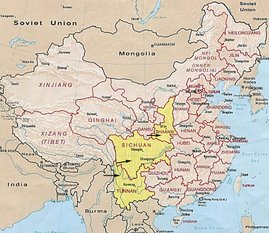My college students are an unusually open-minded and intelligent group of girls. They’re graduating at the end of the semester, and many of them will pursue jobs in customer relations with English-speakers doing business with Chinese export-import companies. After a year of adjusting to Chinese attitudes towards foreign visitors, who’d be better qualified than me to give a lecture on the “do’s and don’ts” of Western culture? I decided to teach the girls a few of the things I’ve observed in hopes that they’d put my advice to use in their upcoming careers. Here are the topics we talked about in class last week:
1. Every one of China’s billion people knows how to say “HELLO.” I’ve had “HELLO!” yelled at me so many times in China that I thought it was important to go over some different greetings. If you think about it, “Hello” is probably the least commonly used of the following:
Greetings
• Hello- is not often used
• It’s good to see you vs. Nice to meet you.
• Good morning/ afternoon/ evening.
• How are you?
• How’s it going?
• How are things?
• How has your day been?
• What’s up?
• What are you up to?
• Hi, Hey (informal)
In post-lecture weeks, my students now greet me with, “JANET! HEL-… I mean, good morning.”
2. Chinese and Western views on privacy are very different. For me at least, respect for the individual is one of the most important elements of our culture. That’s one of the reasons that staring and pointing are discouraged by American parents from the beginning of childhood.
In small Chinese cities such as Zhanjiang, staring at foreigners is a big problem… especially if you happen to be a tall, fair girl like me. I’ve struggled with this element of life in China all year long; however, now at the end of the year I realize it’s more of a cultural difference than outright rudeness. Chinese are curious to see “the foreigner,” but mostly they don’t consider staring offensive. Zhanjiangers also point and gape at traffic accidents, pregnant women and even roadside construction.
Regardless of the reasons behind violations of privacy, I explained why these actions are considered very offensive to many visitors to China:
• Taking pictures
• Staring
• Pointing
• Gossip
• Shouting
3. To a Western visitor in China, it may seem that Chinese are ill-mannered and overly abrupt to one another. Restaurant customers readily snap their fingers and scream “FUWUYUAN!!! (service person)” across the restaurant to get the waitress’s attention.
Chinese language and customs don’t require the same niceties ours do. What’s rude to us is simply everyday conversation to them. Consider the following common Chinese phrases and their direct translations:
Chinese
我要米饭. Qing gei mi fan: Please give me the rice.
请给我面条,谢谢. Qing gei wo mian tiao, xie xie. Please give me the noodles, thanks.
别吃太多菜! Bie chi tai duo cai! Don’t eat too much food.
过来. Guo lai. Come here.
Even with the addition of please and thank you, the Chinese is slightly more abrupt than would be considered polite to Western people. That politeness comes mostly from the use of suggestive modal verbs such as should, could and would, which have no direct equivalents in the Chinese language.
English
I would like some rice, please.
Could you pass the noodles, please?
You should not eat too much food!
Please come here.
4. Another element of life here I’ve found interesting are the constant and very personal comments made on my physical appearance. At least several times a day, a complete stranger tells me, “You are very beautiful!” Each and every class period, students compliment my hair, shoes, and outfit with gasps of delight and excited outbursts of joy.
It’s also common for Chinese to negatively comment on their friends’ appearances. I’ve many times had students and fellow teachers tell me matter-of-factly that I “have spots” on my face. People let their friends know if they’re “getting a little fat” and less attractive students freely admit they are “not so beautiful.”
Looking back on my life as an American, I realized that it’s extremely rare for us to use the word “beautiful” in reference to a person. Additionally, we would much more often compliment parts of a someone’s appearance rather than their overall physicality (“I like your skirt” over “You are so gorgeous!”).
I presented these examples to the students:
A Little Strange
You are very beautiful!
You are very slim!
You are very tall!
Your nose is very high.
More Acceptable
I like your skirt.
Your hair looks cute today.
You look pretty in that color.
I like your shirt!
5. Last but not least, we discussed the connotations of the word “foreigner.” Nine times out of ten, Chinese refer to people from other countries as “foreigners.” I explained that when heard often enough, this word can become offensive and slightly abrasive. It suggests an outsider, or person who does not belong, and thus can be a very isolating term!
• “I saw a foreigner today!”
• “I have never seen a foreigner.”
I asked the students to try using some different terms instead, such as:
• American/ British person/ Australian
• Person from another country
• Native English-speaker
• Visitor
• Non-Chinese
• Westerner
As an example, I compared the Hong Kong and Chinese customs documents. Hong Kong refers to foreigners as visitors, while the Chinese side calls its visitors aliens. The students joked, “Janet, you come from a UFO!” but actually this isn’t far from the way I often feel as an alien living in China!
At the end of the discussion, I made sure everyone understood I didn’t mean to criticize their culture or make them feel uncivilized. I just wanted to explain that people from other countries are just that… people from other countries. They are not here to perform or entertain, and often just want to exist as regular people. I requested that the students put themselves in that person’s shoes for a minute; that they stop and think before snapping a photo of an unsuspecting “foreigner.” I think the lecture was well-received and hope that it will be helpful as the students begin their careers in the world of English-speakers and international trade.
Monday, June 16, 2008
THE FOREIGNER Lecture
发表者
Janet
位置在:
3:05 AM
![]()
Subscribe to:
Post Comments (Atom)


No comments:
Post a Comment